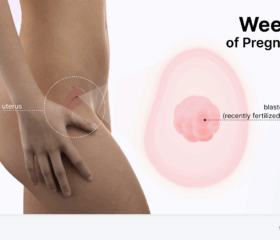Bloating During Pregnancy: Causes and How to Find Relief
Pregnancy usually brings a handful of not-so-glamorous side effects, and one of the most common complaints from moms-to-be is bloating and gas.

While it’s often par for the course with pregnancy, there are ways to combat the baby bloat. From the condition’s causes to common tactics to get relief, here’s everything you need to know about bloating during pregnancy.
What is pregnancy bloating?
Ever get the feeling that your belly is full, tight, and swollen from the inside? That’s the most common description of pregnancy bloating.
Bloating is often accompanied by other undesirable symptoms, such as:
- Abdominal discomfort
- Cramping
- Constipation
- Fullness even after small meals
- Visible abdominal swelling
- Flatulence
As with every aspect of pregnancy, the symptoms and severity of bloating vary from woman to woman. 1
When does bloating usually start in pregnancy?
Bloating is one of the earliest pregnancy symptoms and usually shows up during the first trimester. Many women notice the discomfort around the time their period would have been due, although since premenstrual syndrome (PMS) can also cause bloating, it can be tricky to know whether it’s a sign of PMS or pregnancy. 2
Persistent bloating coupled with missing your period might deserve a pregnancy test for confirmation. If you do, indeed, have a baby on board, expect the bloating to continue or recur throughout your pregnancy.
What causes pregnancy bloating?
While there’s no lone villain to blame for your bloating, those pesky pregnancy hormones are the main culprits.
Specifically, early pregnancy is characterized by an increase in a hormone called progesterone. This relaxes your body’s smooth muscle tissue, including your gastrointestinal (GI) tract. The result is slower digestion, which results in more gas buildup and bloating. 3
As your baby grows, your expanding uterus will put more pressure on your rectum and intestines, also causing slower digestion and accompanying bloating and discomfort. 3
If you’re dealing with constipation during pregnancy—another common symptom—this will only worsen your bloating. 4
Non-pregnancy related causes for bloating
While your bloating may be the result of your pregnancy, that isn’t necessarily the case. Other common contributors to belly turmoil include:
- Diet: It’s possible your pregnancy diet is turning on you. Some foods, even healthy ones, are more prone to producing excess gas than others (e.g., broccoli).
- Eating too quickly: Every time you open your mouth, air can accumulate in your stomach and intestines. This is more likely to happen if you eat too quickly and swallow air in the process. 5
- Gut sensitivities: If you suffer from a condition such as irritable bowel syndrome (IBS), you’re probably more sensitive to gas and more likely to experience painful bloating. 4
How long does pregnancy bloating last?
Unfortunately, you may have to contend with bloating for the entire duration of your pregnancy.
As mentioned, with your pregnancy hormones running the show in the first trimester, bloating is one of the earliest symptoms that show up. However, in contrast to other early pregnancy symptoms (like morning sickness), which often ease up after week 12 or so, you may continue to suffer from bloating until you give birth to your baby.
Bloating doesn’t harm your baby
While it’s certainly not a memory you’ll cherish when your pregnancy days are long gone, you can rest assured that bloating doesn’t cause any discomfort or have any health implications for your baby. (And for the record, developing babies aren’t bothered by excess burping or flatulence, either.)
How to manage bloating during pregnancy
While you can’t totally eliminate bloating during pregnancy, you can still do a few simple things to manage it, at least to an extent. 6 7
Eat well and stay hydrated
One of the most straightforward fixes you can make is to embrace fiber. Gradually increasing your fiber intake (eating leafy greens, fruits, vegetables, legumes, and whole grains) does wonders for regulating bowel movement and preventing constipation.
Note the word “gradually,” as overindulging too fast can actually worsen gas.
You could also consider the BRAT diet (bananas, rice, applesauce, and toast) for temporary relief during troublesome bouts of bloating. These foods are gentle on the stomach and help maintain flow in your GI tract.
Along with your diet, make sure you’re well-hydrated. Skip carbonated beverages—water is your best bet for keeping your digestive system moving and preventing constipation.
Which foods contribute to bloating?
Foods that can be a mixed bag include fermented dishes like yogurt, kefir, sauerkraut, kimchi, and sourdough bread. While it’s usually safe to eat kimchi and other fermented foods while pregnant (and, in fact, it’s often beneficial), they can also be a bloating curse if you don’t introduce them gradually.
There are a few other common foods that are notorious for triggering gas. A short list includes:
- Beans
- Broccoli
- Cabbage
- Cauliflower
- Brussels sprouts
- Onions
You should definitely cut back on fried and fatty foods, rich sauces, and sugary options, including artificial sweeteners (e.g., sorbitol, mannitol, etc.). 8
Eat smaller meals
Don’t underestimate the power of eating smaller, more frequent meals to keep from overloading your digestive system and stockpiling gas. Six small meals or three moderate-sized meals with a couple of pregnancy-friendly snacks in between will do the trick.
Remember to eat slowly to avoid swallowing excess air.
Get regular exercise
In addition to helping things flow internally, getting your entire body moving never hurts. Even if it’s just a short walk, regular physical activity goes a long way toward keeping bloat in check.
You can also throw prenatal massages into this rotation to encourage bowel movements. 9
Try over-the-counter medications
If dietary and lifestyle changes don’t cut it for you, talk to your doctor about safe over-the-counter bloating remedies. Simethicone (Gas-X) is a popular choice for breaking down gas bubbles, while gentle laxatives like milk of magnesia help relieve constipation. 10 You can also take a fiber supplement to help.
When you should contact your doctor
Most pregnancy bloating, while irritating, is harmless. That said, if you’re suffering from extreme bloating that makes it difficult for you to live a normal life, you should get in touch with your doctor.
When bloating may signal something serious
If you suffer from a condition like IBS, you may need to speak with your doctor about how to manage pregnancy bloating.
It’s also important to get medical attention if you experience more concerning symptoms alongside your bloating, such as:
- Severe abdominal pain
- Cramping
- Bloody stool
- Severe diarrhea or constipation
These symptoms could be signs of a miscarriage or a more serious condition, so make an appointment with your doctor right away. 11
Final thoughts
No one likes feeling bloated, but try not to let it get you down. With a few behavioral tweaks here and there—and a visit to your doctor if you need a little extra help—you’ll be well on your way to managing pregnancy bloating like a champ.
Article Sources
- The IBS Network. "Wind and Bloating" Retrieved July 8, 2025.
- Westbank Pregnancy & Family Care Center. "When PMS Symptoms Are Signs of Pregnancy" Retrieved July 8, 2025.
- Sanford Health. "Coping with gas during pregnancy" Retrieved July 8, 2025.
- Johns Hopkins Medicine. "Bloating: Causes and Prevention Tips" Retrieved July 8, 2025.
- Northwestern Medicine. "Quick Dose: Is Eating Too Fast Unhealthy?" Retrieved July 8, 2025.
- The Permanente Medical Group, Inc.. "Constipation and Gas in Pregnancy" Retrieved July 8, 2025.
- UNM Health. "5 Tips to Relieve Pregnancy Constipation" Retrieved July 8, 2025.
- Nemours KidsHealth. "Using Artificial Sweeteners During Pregnancy" Retrieved July 8, 2025.
- Michigan Medicine. "Abdominal Self Massage" Retrieved July 8, 2025.
- Northfield Hospital & Clinics. "Over-the-Counter Medications Safe for Pregnancy" Retrieved July 8, 2025.
- Johns Hopkins Medicine. "Miscarriage" Retrieved July 8, 2025.







